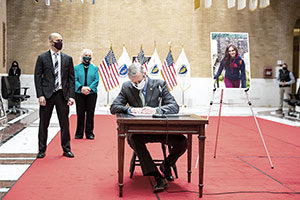
Peter DeMarco and Laura Beth Levis. — Photo courtesy of Peter DeMarco
By Hongyu Liu
As the first speaker, Peter DeMarco stepped up to the rostrum to speak at the State House for a bill signing ceremony on January 15. “It took us nearly two years to get here. I wasn’t sure if we could even reach this stage. But in the end, Laura’s law passed unanimously,” DeMarco said in his speech.
Shortly thereafter, Governor Charlie Baker signed An Act Ensuring Safe Patient Access to Emergency Care (S.2931).
The law requires “hospital emergency departments in the state to have entrances that are properly monitored by security, clearly marked, and easily accessible, particularly to patients in distress,” State Representative Christine Barber’s office explained in a letter published by The Somerville Times.
The law is also known as “Laura’s Law,” named after DeMarco’s deceased wife.
Laura Beth Levis, the late wife of DeMarco, had an asthma attack on September 16, 2016. She drove herself to the hospital at about 4:00 a.m. but found the door to the emergency room locked. Unable to reach the other entrance, she called 911 and told her whereabouts. The EMTs found Laura right in front of the hospital about ten minutes after the call. Unfortunately, she died several days later.
In the next two years, DeMarco investigated why it took the first responders ten minutes to reach Laura. On November 3, 2018, he published “Losing Laura” in The Boston Globe, presenting his conclusions in the matter.
“It was a series of one failure after another,” DeMarco said in an interview. “The reason why I wrote the story was to make sure that no one will ever go through this again.”
While working on the article, DeMarco noticed the absence of a sign for the entrance in front of the Somerville Hospital when Laura arrived. “I asked the Department of Health officials why they did not cite the hospital for not having an emergency sign after investigating Laura’s death,” he said. “They said they did not have the ability to cite the hospital because there were no regulations regarding emergency room signage. When I heard that, I thought that has to change.”
Days after publication, Senator Pat Jehlen contacted him and the two had a conversation in a local coffee shop. She was moved by Laura’s story and said, “people don’t remember every article they have read, but people remember that story.”
“She said to me, ‘Whatever you want us to do, I want to do it,’” DeMarco recalled of his meeting with Jehlen. “And she meant filing legislation.”
DeMarco accepted Jehlen’s offer. The two were also joined by state representative Christine Barber and they filed the bill in January 2019.
Jehlen said making a bill into law is extremely difficult. “Lots of bills don’t have enough support, or they have too much opposition. Very few of them will become law,” she said.
Over the next two years, DeMarco remained busy reaching out to people who would potentially provide testimony for the committee hearings. “It wasn’t hard at all for me to keep pushing through this because it was about Laura,” he said. “I was not about to give up.”
The Senate eventually passed the bill on October 22, 2020. The bill still needed to be passed by the House of Representatives separately before it could be enacted.
However, the pandemic slowed down the legislation process dramatically. DeMarco recalled, “For months, there were no bills heard. No laws really passed other than coronavirus measures.”
The legislative process in Massachusetts follows a two-year cycle. It means that a bill has to go through the whole process within two years before it expires. The deadline for Laura’s Law was January 5. “It simply became a question of whether there will be time for Laura’s law actually to be heard and voted on by the House of the Representatives,” DeMarco said. He made a distress call to his family and friends, asking them to write, email, or call the State House days before the due date.
At first, the message spread through DeMarco’s classmates from Lynnfield and Tufts University, and Laura’s former co-workers. Then the Asthma and Allergy Foundation of America picked up the call and spread the words. DeMarco later wrote a commentary on WBUR saying that “Somerville and Cambridge city councilors also joined in the chorus.”
The call spread through the commonwealth. Eventually, the State House received more than 1,700 emails and 500 phone calls. “It wasn’t hard at all to convince people to help me. They wanted to pass this bill to remember Laura. I didn’t expect so many would come to the rescue of the bill by the very end, but they did,” DeMarco said emotionally.
At 11:28 p.m., on January 5, minutes before the deadline, the House of Representatives passed Laura’s Law. “Pete was a tremendous advocate,” Senator Jehlen commented. “He is persistent. He is eloquent.”
Although DeMarco said that Laura’s Law will not take effect until 2022 due to the pandemic, he expects hospitals to take intermediate steps as they can.
Sen. Jehlen said in her speech at the State House that DeMarco’s advocacy had already made two hospitals reassess their signage and the monitoring of their entrances.
“I wrote Laura’s story so that nobody dies in front of that emergency door ever again. Now there’s a law to make sure that it doesn’t happen. That’s an amazing thing,” DeMarco commented.
DeMarco believes that there is more to be done to address the other failures in Laura’s story. “I will potentially return and look at the 911 system to see if we can bring change by more legislation, or at least more advocacy,” he said.
Looking forward to talking with DeMarco about the next step, Jehlen believes he “doesn’t feel like he’s finished.”
After the incident, he also devoted himself to educating people about asthma. He suggests that people with asthma tell others about their symptoms for safety and make sure they have enough inhalers or prescriptions during the asthma peak week.
“Asthma peak week is the third week of September, which is the worst for the asthmatics due to pollen and viruses,” he said. “Asthma peak week was the week that Laura died. She did not know about the asthma peak week. I didn’t either. If she had just known, maybe everything could be different.”

Gov. Baker signing Laura’s Law.
















Reader Comments